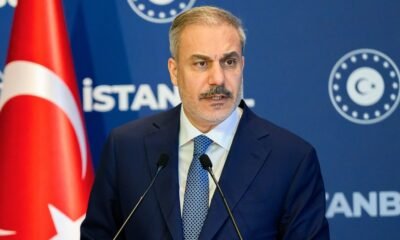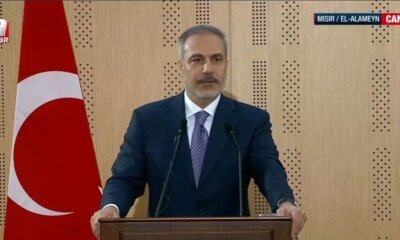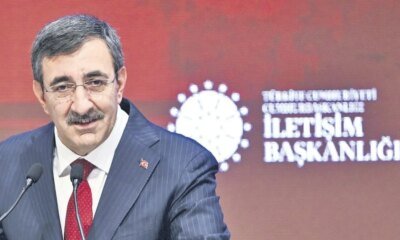Economy
Spotify reportedly probes Türkiye editors amid bribery allegations
Music streaming giant Spotify has launched an internal investigation into its editors in Türkiye following allegations of bribery linked to the platform’s local charts, a report said Monday.
The move comes after mounting criticism from Turkish artists over the lack of transparency in how Spotify’s charts are compiled, as well as accusations of censorship, preferential treatment and artificial “bot” streams.
Spotify, with millions of users worldwide, plays a major role in helping artists reach audiences. However, in Türkiye, many musicians have voiced frustration over opaque ranking criteria and alleged misconduct.
Many prominent Turkish artists have publicly questioned the integrity of the platform’s local operations.
Amid reports of bribery allegations in the formation of charts, Spotify’s headquarters has launched a probe into its editors in Türkiye, private broadcaster Habertürk reported Monday.
Spotify’s decision follows an investigation launched last month by the Turkish Competition Authority (RK) into claims that the Swedish company has unfairly disadvantaged rivals and discriminated against certain artists and content creators.
The watchdog is also examining allegations that Spotify has given some musicians greater visibility, engaged in unfair practices in the distribution of royalties, and potentially violated the Law on the Protection of Competition.
In a statement, Spotify, which launched in Türkiye in 2013, said its operations complied with “all applicable laws” but would cooperate with the investigation.
“We are cooperating with the investigation, are actively seeking to understand it, and will work toward a swift, constructive resolution with the Turkish Competition Authority,” the statement said, without mentioning the playlist allegations.
According to Spotify, the company paid over TL 2 billion (nearly $50 million) to the local music industry in 2024, calling its service “pivotal in growing Turkish artists’ royalties globally.”
Separately, Deputy Culture and Tourism Minister Batuhan Mumcu last month called for legal action against Spotify, citing its “refusal” to respond to requests to remove playlists with names deemed offensive.
“Spotify persistently refuses to take the necessary steps despite all our previous warnings,” Mumcu wrote on the social media platform X. “Content that targets our religious and national values and insults the beliefs of our society has not been corrected,” he added, saying Türkiye had been “closely monitoring content on Spotify for a long time.”
He pointed to content published “under the guise of ‘playlists’… that disregards our religious sensitivities toward our Prophet Mohammed, deliberately and unacceptably targeting the beliefs, sacred values, and spiritual world of our people.”
Economy
Japan’s political crisis risks budget delays, rate hike uncertainty
Japan’s mounting political uncertainty could extend policy paralysis, potentially affecting the drafting of next year’s budget and the timing of the central bank’s next interest rate hike, analysts warn, further clouding the outlook for the fragile economy.
Prime Minister Shigeru Ishiba is facing increased calls from within his ruling Liberal Democratic Party (LDP) to step down and take responsibility for the party’s huge defeat in an upper house election in July and a lower house poll last year.
While Ishiba has denied he has any plans to resign, his fading support has triggered inevitable questions about his political future, and analysts say a leadership change would likely have implications for the outlook for fiscal and monetary policy.
In a meeting on Friday, lawmakers decided to consider holding a rare leadership race even with the party head Ishiba still presiding. Under LDP rules, such a race would take place if the majority of the party’s lawmakers and regional heads agreed to hold one.
But it is uncertain how long it would take for the party to decide, according to lawmakers and government officials familiar with the procedure told Reuters.
That contest could happen in September at the earliest, they say, which would allow the new administration to compile a spending package to cushion the economic blow from U.S. tariffs.
But if the race does not take place in September, it may have to wait until early next year to avoid disrupting the government’s drafting of next fiscal year’s budget, they say.
“We would not be surprised if the LDP calls for a leadership election in September,” UBS analysts said in a research note. “It seems that uncertainties regarding politics are unlikely to resolve soon.”
In Japan, the Ministry of Finance collects spending requests from ministries in August and finalizes the government’s draft budget in late December. The budget must pass parliament in time to take effect from the April start of a new fiscal year.
Failure to pass the budget through parliament would force the government to compile a stopgap budget, which could hurt the economy by causing delays in expenditure.
Some ruling party lawmakers say there is no choice but for Ishiba to step down to resolve the deadlock.
Having lost control in both houses of parliament, the LDP-led ruling coalition needs opposition party support to pass legislation and the budget through parliament. Opposition parties have ruled out forming a coalition unless Ishiba steps down.
“Japan needs a stable coalition government. Otherwise, it’s impossible to pursue consistent policies,” LDP heavyweight Ken Saito told Reuters last week. “It’s best for the LDP to seek a coalition partner under a new leader.”
Complication for BOJ
Ishiba’s weak political standing and prolonged political uncertainty also complicate the Bank of Japan’s (BOJ) decision on how soon to resume interest rate hikes.
While few analysts expect the BOJ to hike rates at its next policy meeting in September, some see a good chance of action in October, December, or January next year when more data becomes available on the impact of U.S. tariffs on the economy.
Known as a fiscal hawk, Ishiba has endorsed the central bank’s efforts to gradually wean the economy off a decadelong, massive stimulus as inflation remains above its 2% target for well over three years.
But his bitter election defeat has made his administration vulnerable to calls for big spending and loose monetary policy.
Many opposition parties have urged the BOJ to hold off, or go slow, in raising rates and focus on supporting the economy.
If the LDP were to hold a leadership race, the event could put the spotlight on the views of candidates like Sanae Takaichi, a reflationist-minded lawmaker who in the past blasted the idea of interest rate hikes as “stupid.”
All this could discourage the BOJ from raising rates in the coming months to avoid drawing unwanted political attention.
“All we can say is that we would continue to take appropriate policies to sustainably and stably achieve our 2% inflation target,” Governor Kazuo Ueda told a news briefing earlier this month, when asked how the BOJ would respond if political changes lead to fresh demands on monetary policy.
“It’s impossible to predict how politics will unfold, which means for the BOJ it’s best to take a wait-and-see stance,” said a source familiar with the bank’s thinking.
Economy
Türkiye secures $1.8B foreign financing for strategic southeast project
Türkiye has secured 1.55 billion euros ($1.8 billion) in foreign financing for the Dörtyol-Hassa Highway and Railway Project, which is expected to significantly boost the competitiveness of the southeastern region.
The funding is part of the government’s ongoing efforts to attract international funding for infrastructure, particularly in areas affected by the devastating February 2023 earthquakes.
The latest agreement was signed between the Treasury and Finance Ministry and a consortium of lenders led by France’s Societe Generale, Anadolu Agency (AA) reported on Monday.
The financing is backed by the Swedish Export Credit Agency (EKN) and the Islamic Corporation for the Insurance of Investment and Export Credit (ICIEC), which operates under the Islamic Development Bank. Several commercial banks also joined under these guarantees.
The southeastern region is still recovering from earthquakes that struck 11 provinces in February 2023, claiming more than 50,000 lives and destroying hundreds of thousands of buildings and severely damaging infrastructure.
Strategic link
The project, overseen by the Transport and Infrastructure Ministry’s Directorate General of Infrastructure Investments, will directly connect the Gulf of Iskenderun with southeastern Türkiye.
Once completed, it will link the gulf to industrial zones behind the Amanos Mountains and to the city of Gaziantep via both road and rail.
Officials say the project will strengthen the region’s transport infrastructure, stimulate trade and tourism, support economic and social development, and make a significant contribution to Türkiye’s exports.
It is also expected to improve earthquake resilience in the transportation network.
With this latest deal, the total amount of foreign funding secured for Türkiye’s railway sector alone this year has reached approximately 4.2 billion euros.
In late December, the government announced a $14 billion regional development plan that covers some of the quake-affected provinces and aims to reduce the economic gap between the southeastern region and the rest of the country.
Economy
Türkiye’s industrial output expands 8.3% in June
Türkiye’s industrial output rose 8.3% yearly in June, according to official data from the Turkish Statistical Institute (TurkStat) released on Monday.
Of the 12 sub-sectors measured, 10 posted annual rises, while two declined.
The high technology index soared 88.2%, capital goods climbed 20% and manufacturing rose 9.5% compared to June last year.
However, the durable consumer goods index declined by 1.4% annually, and the electricity, gas and steam index decreased by 1.1%.
Monthly, overall industrial production expanded 0.7% in June.
Of the 12 sub-sectors measured, six posted monthly rises, while the other six declined.
Among the monthly figures, high-technology production surged 38.1%, capital goods rose 4.8%, and the electricity, gas and steam index gained 1.9%.
Meanwhile, production in mining and quarrying declined 5% month-over-month, durable consumer goods fell 4.4% and medium-high technology was down 3.5% in June.
Economy
Jobs report confirms ‘signs of fragility’ in market: Fed official
A recent U.S. employment report has shown “signs of fragility” in the labor market, a senior central bank official said Saturday, backing the idea of three interest rate cuts this year to guard against further weakening.
In prepared remarks to a summit in Colorado, Federal Reserve (Fed) Vice Chair for Supervision Michelle Bowman called for a “proactive approach” in lowering the benchmark lending rate.
Doing so “would help avoid a further unnecessary erosion in labor market conditions” and reduce the chance that the Fed’s rate-setting committee will need to make a larger cut if the jobs market worsened further, she said.
Bowman also made the case that price increases from U.S. President Donald Trump’s sweeping tariffs this year will likely represent “a one-time effect.”
She expects inflation will return to the Fed’s 2% target after the tariff effects dissipate.
“It is appropriate to look through temporarily elevated inflation readings and therefore remove some policy restraint to avoid weakening in the labor market,” she added in the remarks.
Bowman was one of two Fed governors to dissent at the central bank’s July policy meeting, a rare occurrence even as officials voted to hold rates steady for a fifth straight gathering.
Her latest remarks underscore growing divisions among Fed policymakers about when the independent central bank should begin slashing rates again.
The Fed has come under intense pressure from Trump recently, as the president repeatedly lambasts Fed Chair Jerome Powell for its decisions to keep rates unchanged.
Bowman, who was nominated by Trump in 2018 to the Fed’s board, also took aim at government data over its declining survey response rates and other issues, saying the monthly numbers have become increasingly tough to interpret.
Even as she acknowledged weakness in the labor market, she said that she remained “cautious about taking too much signal from data releases.”
On the day that the Labor Department released July’s jobs report, which showed cracks in the market with employment in May and June revised down significantly by 258,000 jobs, Trump ordered the firing of the commissioner of labor statistics.
Without providing evidence, he accused the commissioner, Erika McEntarfer, of manipulating data for political reasons.
Economy
Senegal’s PM calls for deeper economic ties with Türkiye
The prime minister of Senegal, Ousmane Sonko, lauded Türkiye’s significant investments in his country on Saturday but said there was still room for greater potential in cooperation.
“Türkiye is already a major investor in Senegal, but that is not enough. We believe we can do much more and do it better,” said Sonko, speaking at the Türkiye-Senegal Business Forum in Istanbul, where he is wrapping up a visit.
He also said that Senegal, following last year’s presidential election, has embarked on a new path focused on sovereignty, social justice and prosperity.
Sonko said the West African nation’s government aims to transform the country through partnerships among the state, the private sector, and foreign investors.
Highlighting Senegal’s stability, strategic location, natural resources, skilled workforce and competitive business environment, Sonko invited Turkish companies to invest in areas such as power generation, labor-intensive manufacturing, e-commerce, artificial intelligence, health care infrastructure, pharmaceuticals and biomedical equipment.
He also welcomed President Recep Tayyip Erdoğan’s goal of raising bilateral trade to $1 billion.
Sonko invited Turkish firms to the Diass Special Economic Zone near Dakar and said Senegal would be honored to host Türkiye at the Invest in Senegal forum on Oct. 7-8.
Economy
Hazelnut prices soar after frost hits major producer Türkiye
Wholesale hazelnut prices have surged this harvest season due to frost damage in Türkiye, the world’s leading producer, where the crop yields are expected to shrink this year.
In April, a cold snap, unseen in years, affected a variety of domestically produced crops, pushing hazelnut prices higher even before the harvest began.
Agriculture Minister Ibrahim Yumaklı called it one of the worst agricultural frosts in the country’s history. Experts have attributed it to climate change, which they claim is increasing the frequency of extreme weather events, as the underlying cause.
According to the Amsterdam-based commodity data platform Vesper BV, a metric ton of Turkish hazelnuts now costs around 9,400 euros ($10,900), an increase of roughly 34% since the start of the year, Vesper told Deutche Presse-Agentur (dpa).
Around 60% of the world’s hazelnuts grow primarily on the green mountain slopes along Türkiye’s Black Sea coast, where the nut is called “green gold” because of its economic importance. Major global chocolatiers such as Italy’s Ferrero source their nuts from this region.
Hamburg trading house Schluter & Maack estimates that wholesale prices for Turkish hazelnuts have risen by approximately 40% since the cold snap, according to a report by dpa, published on Sunday.
Still, surpluses from previous harvests and good yields in other producing countries have partly offset the losses.
In Türkiye, the state grain board raised the minimum purchase price for hazelnuts just days ago. For the 2025-2026 season, it set the price at TL 195 ($4.80) per kilogram.
The last major frost-related event, before April, affecting crops in Türkiye, occurred in 2014. Following the frost this year, which took place in dozens of provinces across the country, even the central bank warned of a temporary increase in food prices due to the impact of the cold weather.
The Turkish Statistical Institute (TurkStat), in its assessment published in May, also estimated that fruit, beverage, and spice crop production will be 21.4 million tons in 2025, with a 24.4% decrease compared to the previous year.
This has raised concerns among producers of chocolate-hazelnut products, as prices for these goods have also been rising for some time. Accompanied by earlier hikes in global prices of other goods, including cocoa and coffee, the chocolatiers are closely following the shifts in the market.
The production of cocoa was particularly at risk last year as drought hit major producers in West Africa.
Price comparison app smhaggle reviewed four well-known products in the category for the German business newspaper Handelsblatt. Its analysis found that since 2022, prices in the country have climbed by 10% to 65%, in some cases outpacing the average rate of price increases.
The price surge is hitting companies that also source expensive cocoa especially hard, such as Germany’s Ritter Sport, maker of the iconic square chocolate bars.
Ritter Sport processes several thousand tons of hazelnuts annually, mostly from Türkiye’s Black Sea coast and partly from the U.S.
A company spokesperson said the frosts in Türkiye and rising prices have had a tangible impact on Ritter Sport. “We are seeing a massive double burden on the raw materials side,” he said, adding that the strain was not expected to ease up in the future.
The price hikes will likely hit the world’s largest hazelnut buyer the hardest: Nutella-maker Ferrero, which is estimated to source about one-third of all hazelnuts globally.
The Italian company declined to comment on prices when asked, but denies any supply disruptions. The company said it sources hazelnuts not only from Türkiye but also Italy, Chile, and the U.S., which ensures supply security.
-

 Economy3 days ago
Economy3 days agoTürkiye’s export outlook remains robust despite global uncertainty
-

 Politics3 days ago
Politics3 days agoTürkiye urges int’l pressure to stop Israel’s Gaza plan
-

 Politics2 days ago
Politics2 days agoTurkish FM Fidan to visit Egypt to discuss Israel’s Gaza plan
-

 Politics3 days ago
Politics3 days agoGreek Cypriot biker protest halts Lefkoşa border crossings
-

 Daily Agenda2 days ago
Daily Agenda2 days agoForeign Minister Fidan: Israel persistently sabotes cease -fire initiatives
-

 Daily Agenda2 days ago
Daily Agenda2 days agoVice President Yılmaz: To create a chaos environment for their purpose
-

 Politics3 days ago
Politics3 days agoArmenia, Azerbaijan agree to groundbreaking peace agreement
-

 Daily Agenda2 days ago
Daily Agenda2 days agoLawyer Mehmet Yıldırım and CHP Provincial Chairman Özgür Çelik Came Out




